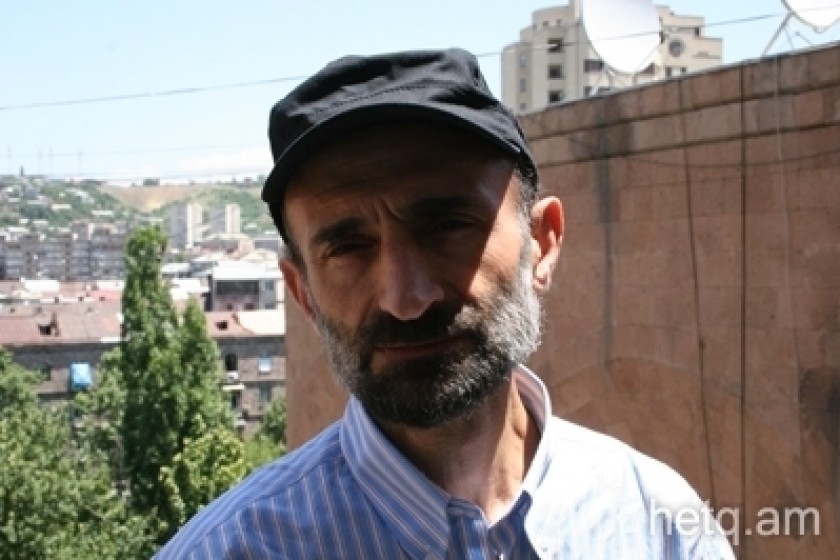
Margin Notes: About Patriotism
The horse herder knew his Armenian history well and was the only man in the mountains that felt his Armenianism. The others knew that they were shepherds, drovers, tillers, milkers and shearers who went back down the valley Tzmakout with the first cold, in front of the heat, with the coolness they come out of the mountains. (Hrant Matevosyan, "Mesrop")
After accepting another periodic offer of Hetq to write, I couldn’t put pen to paper for a long time. The opportunity arose when the Utopia organization proposed that I be interviewed about the topic, “Modern Processes in Armenian Society. Thus, my first writings (marginal notes), to a lesser or greater degree, refer to the topic of that interview: Nationalism, authority and the media.
I agree that the expression “the villager is not a patriot, when taken out of the context of speech, can appear incomprehensible or even insulting. (Here I bring the following comment left by a viewer, Mr. GK Harutyunyan, saying, “Geez, Hrach Bayadyan, who do you think you’ve become to talk about villagers that way.” And while I think that my subsequent explain was sufficient to explain what I meant, I will now try to make it even clearer.
What bases do I have to say such a thing, if I try to shape the question a bit more delicately? I was born and raised in a village. My parents still live there. Until recently, for many long years I participated in the summer chores of the village. I have scythed and I invite Mr. Harutyunyan to come to the village and reap next year. That is if he’s ever picked up a scythe.
In other words, my knowledge of the village and villagers is based on personal experience and not on official data or TV reportage. In addition, I am familiar with Armenian literature that, for understandable reasons, is mainly about the village and villagers. This affords me the right to speak about the villager.
Thirdly, that idea refers to villagers in general and, in that sense, Armenian villagers are no exceptions. In studies of the nation and nationalism, the “nationalization of the villager”, as part of the nationalization process of society, is a well-known issue. Étienne Balibar, for example, observes that the French villager was finally “nationalized” only when, as a class comprising the bulk of the populace, it was already on the verge of extinction. Others claim that even during the years of mass Russification of the Soviet peoples, the Russian peasant (muzhik) remained as such and still remains un-nationalized.
The nationalization of the population takes place, among other things, via universal school education, obligatory military service, free movement of labor, the strengthening of joint traditions, holidays and rituals and, of course, through the crafting and spreading of a patriotic ideology. Thus, we are talking about patriotism as an ideology. The claim heard today on various occasions that the school must prepare “patriotic citizens” speaks directly to this. When does a villager become a “patriotic citizen”? When he or she becomes the bearer of a specific ideology and consciousness. And even when they become so do they continue to remain villagers?
History is replete with attempts to forge an army of patriots from the people in a short time. A shining example is fascist Germany when not only were villagers nationalized very quickly but also women. To avoid yet another misunderstanding, let me clarify. Patriotic ideology as a rule, as an expression of nationalism, is built on the principle of patrimony, which for women envisages another less sympathetic role; perhaps another type of patriotism. (Parenthetically, let us note that the two concepts “patriotism” and “patrimony” are derived from the root word pater or father). This has done with the assistance of a huge propaganda machine, which becomes even more influential, when accompanied by violence, either real or possible.
Thus, patriotism is not at all a “natural” or innocent thing, even if that’s how it is portrayed and understood. It is an ideology, perhaps a necessary one for a given people and each nation-state. It can sow feelings of belonging and responsibility in individuals and can assist society in reaching the most desirable heights of unity and harmony. On the other hand, it is unavoidably constructed on various forms of discrimination, on hierarchal societal structures and frequently on xenophobia. In its most crude of forms it often serves the interests of the powers that be.
What has been said allows us to claim (let us also remember what H. Tumanyan wrote about the villagers of his day) that we can only talk about the nationalization of the Armenian villagers starting from the Soviet period, with all its ambiguities.
When the village hero in the film “We are our mountains” mouths the much loved expression “We are important and so is America”, the “we”, as you know, doesn’t at all refer to the Armenian people.
Today, in conditions of extreme social inequality, deafening injustice, exodus and labor migration, and outdated official nationalist populism, what can be said regarding the patriotism of the villager and, in general, that of the citizens of Armenia?
 Videos
Videos Photos
Photos
Comments (3)
Write a comment